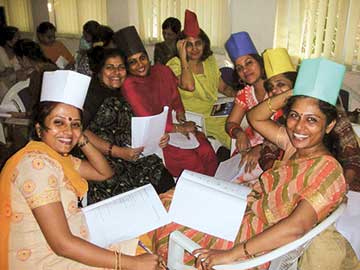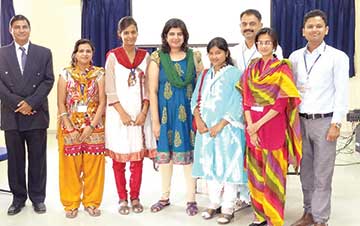Vidushi Chaudhry
It is an open secret that the B.Ed qualification is a broken system. Touted to prepare our teachers to teach in our vast and diverse land, this one-size-fits-all formula has failed and failed unequivocally. B.Ed programs have not adapted with time, and are inadequate in preparing our teachers as leaders, facilitators, knowledge workers and thinkers. The 21st century skills that they purport to teach are missing in the very system that trains them. Thus, schools, across all boards, are using professional development programmes to fill the gaps in teacher education that B.Ed failed to fill.
As a co-founder of Mindsprings Enrichment Centre in Mumbai and before that at the Cathedral School, I was part of the teacher training complex for six years. I created and conducted workshops on learning difficulties, giftedness, language, assessment and lesson planning, travelling to both small schools in rural Maharashtra, and addressing teachers in the metros. Here are some insights from that incredible, heady and instructive time in my career.
 Needs across Boards
Needs across Boards
If you survey any ten government school principals and ask them if their teachers are adept at delivering the curriculum or put the same question to ten heads of IB schools, the answer remains the same, No. Thus, schools call upon private organizations like mine to step in. The crisis is so deep that almost every school system is allocating days on their calendars for teacher training and upgradation. But this is not the only reason. In an ever-changing world where teachers remain reluctant to use technology, our students are digital natives. In addition, we want to teach the skills of collaboration, research, problem-solving and critical thinking to our students. Our teachers cannot rely either on their education or their own experience as students to deliver these. Their plight is an extraordinary one, and it is the student in the class who ultimately suffers. Thus, the need for training is acute.
Lack of self-awareness by schools
I have conducted workshops in schools, where at lunch, the staff has complained that they don’t need training in the area I am focusing on, and ask that I focus on a topic I mentioned in passing. When we sent schools a diagnostic to self-assess what workshop they would like to choose, we often got no response. They preferred if we sent them a list of discrete workshops to choose from. While school heads often are aware of their staff needs, prioritizing whether a stress management workshop should be conducted or one on using technology in the classroom is still a difficult decision for many schools. Similarly, Hindi teachers can often be sent to English workshops and transfer the language learning concepts to their subject, but it is a strategy that school heads continue to frown upon.
A corollary of this problem is sending unmotivated teachers to a workshop for reasons of convenience, availability, incentive or something unrelated to subject matter. Thus, sometimes I will have a teacher sitting in a room, who comes late, takes an hour for lunch or leaves early, because the subject matter isn’t relevant to her. She will make sure I send her the presentation though, because she is expected to share it within her school. I am stumped at what value she could pass along and if the school wasted the entire money they spent on sending her.
A shortage of trainers
If you have ever sat through four hours of a droning lecture delivered in soporific tones, you know the quality of the trainer matters, as does their delivery style. India has a paucity of quality teacher trainers. Is there a database where you can find an exhaustive list of trainers? Is the quality of trainers offered by the State board similar to those available to ICSE schools? Can you find excellent trainers to teach fourth graders science experiments or public speaking to the tenth grader? What is a fair price to pay for teacher training? We need a trainer pipeline, with schools identifying talented and multi-skilled teachers, and investing in them to become trainers. If we don’t, we will have to continue relying on trainers from the west, who have brilliant ideas, but ideas which may or may not suit the Indian context.
The tyranny of time
Most current teacher training, like the school day, is dictated by the clock. Thus, schools can allocate 1-3 days for a staff member or the whole school staff to be trained. However, they find it difficult to organize a two-hour follow up after three months to see what is being implemented. We offered schools free follow up reports as part of the workshop cost, but it was never utilized, and thus after two years we stopped offering it.
Every time a school made gains in training, it was because they invested not just time, but their will in the training. Shishuvan School, Mumbai was an excellent example. They asked for their teachers to become better writers. But they gave us four hours every month for two years to do it in. In addition, their teachers did a written assignment before the training, that was corrected and their feedback tailored to their learning needs. In that time, we were able to help teachers first see their own errors, then correct them and read at a more challenging level. We were not only able to influence writing but also increase their exposure to international best practices, and give them an appreciation for the wonders of Calvin and Hobbes! It worked because they gave us the time to create a difference.
 The lure of the standalone workshop
The lure of the standalone workshop
But one-off workshops are alluring. Have you ever felt the heady intoxication of a workshop delivered by a brilliant speaker? You feel invincible, as if this new knowledge will awaken all the slumbering students in your class. I have. It’s perfect. But the euphoria fades in the face of the harsh realities of curriculum and time constraints. And you wonder, how can I apply this to the classroom? Doubts assail you – what if I didn’t understand the theory. And soon, you forget the workshop and go back to doing things the way you always did.
I am increasingly critical of the standalone workshop, and I see it only as a purpose of assessing whether a speaker and their philosophy are interesting and worth investing time and energy in. Instead, there are a few interesting models operating now. Adhyayan Asia offers workshops under their larger school quality improvement and transformation focus. Once the school staff has identified their priorities through guided reflection, they decide a priority list of targeted workshops. These are then used for teacher upgradation, but the buy-in from the teachers, school leaders and staff is complete.
Another model is the educational consultant, who assesses the strengths and weaknesses of a school, and in this larger role, offers workshops. But implementation is built into this system as the responsibility for execution lies with the consultant. Usha Pandit, my mentor and business partner, creates measurable change through this model.
Teacher training is a multi-headed hydra that needs to be tackled by creating a pipeline of effective trainers; creating school structures that allow training to percolate through the system and down to the student; schools investing time and administrative will in the process and investing in self-diagnostic processes to understand their own training needs. Till then, enjoy your one-off workshop!
So do workshops work? At present, workshops are being force-fit into the school year and suffer for the lack of time, will and intention.
The author is currently pursuing a teaching certification in Arizona, while she consults for educational organizations. She can be reached at vidushi.chaudhry@gmail.com.
Related articles
Teaching the teacher?
Posters from poetry: engaging with pre-service teachers
